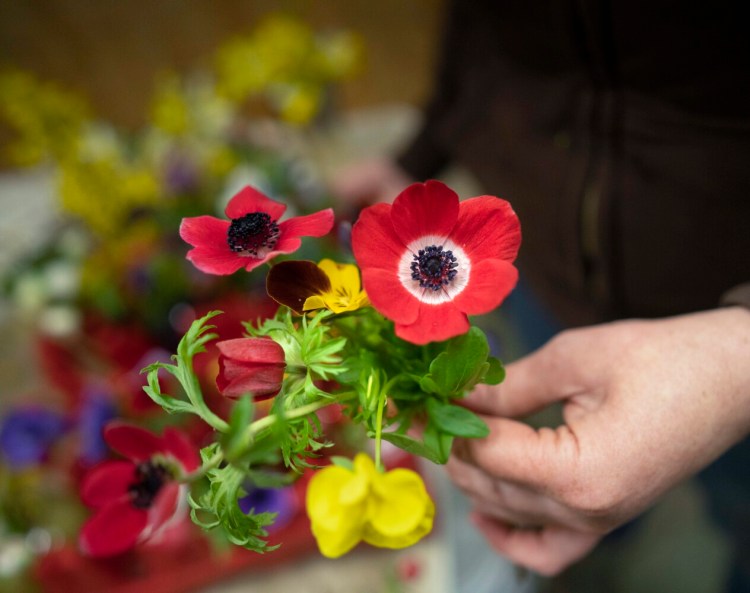When the U.S. government buys flowers, it makes sense they should buy flowers grown by Americans on American soil.
That’s not just jingoism. It makes financial sense by supporting our local economy. And it makes environmental sense. But it is not what is happening.
“Under the current system, the vast majority of flowers purchased by the government are foreign-grown, meaning that money is sent to stimulate foreign economies,” Sen. Angus King is quoted as saying in a press release that announces that he and Rep. Chellie Pingree support the American Grown Act, which would require that the Office of the President and Departments of Defense and State purchase only U.S.-grown cut flowers.
“I’m always looking for ways to support the over 250 farms in Maine that grow cut flowers,” said Pingree, who is co-chair of Cut-Flower Caucus and a co-sponsor of the bill, “especially since many of these small businesses were hit hard during the pandemic as special events were postponed or canceled.”
“It is part of a larger conversation about ways that we can take action to shore up the economic sustainability of our farms here in the U.S.,” she added through her office spokesperson. “As we know, actively working farmland is less likely to fall to development, and keeping that land in farming helps it to remain another important part of the climate solution.”
The bill, which was introduced in the House in July, has been referred to a subcommittee of the Committee on Foreign Affairs.
Two people in the cut-flower business in Maine stressed to me the environmental and humanitarian benefits of the proposed bill.
Cindy Creps, of Meadow Ridge Flower Farm, doesn’t expect much financial benefit if the bill becomes law.
“I don’t think anyone from the federal government will come to Hebron, Maine, to buy my flowers,” she said with a slight chuckle. “But it will help the industry as a whole because about 85 percent of the cut flowers sold in the United States are foreign grown – places like South and Central America and the Netherlands – and that number is down from the 92 percent it used to be.
“When I think of the people in other countries working for such low wages with all the chemicals they use, it is important to buy local,” she said.
She noted that many people put the flowers they buy on the dinner table as centerpieces, perhaps unknowingly putting pesticide-laden products close to their food.
Add to that the carbon footprint of shipping the flowers from thousands of miles away to U.S. markets, said Rayne Grace Hoke, a florist working as Flora’s Muse out of Wells. The pandemic has been tough on the floral community, Hoke said. In 2020, the business almost disappeared as most weddings and other events were canceled. This year, two years of events are being crammed into one, so it is difficult to get material. “You can’t get hydrangeas this year,” she said, as just one example.
The offices of King and Pingree couldn’t estimate how much money the federal government spends on flowers as, flowers don’t have their own line item in budgets.
“However, since we are talking about taxpayer dollars it seems only appropriate that they should be supporting American producers, similar to the ‘Buy American’ preferences that already exist for countless other products that the federal government buys,” Rep. Pingree said through her office.
Talking with Creps and Hoke made me think that if the people are going to demand that the government buy only U.S.-grown flowers, shouldn’t we taxpayers make the same demand of ourselves? You can buy Creps’ flowers at her farm in Hebron or from her stall at the Portland Farmers’ Market. But she encouraged Mainers to buy local flowers from local vendors wherever they live.
Hoke is a member of Slow Flowers, a national group. (Find its local members at slowflowers.com.) She compared Slow Flowers to Slow Food, an international movement that promotes local food cultures and traditions. She reminded people to buy flowers in season, in other words those that would grow at that moment at local flower farms or, later in the fall, in high tunnels (aka hoop houses) and such. People’s desire for out-of-season flowers has a high environmental cost.
So after your own flowers are done for the season, go to any local flower shop, and ask for American-grown flowers and greenery.
Tom Atwell is a freelance writer gardening in Cape Elizabeth. He can be contacted at: tomatwell@me.com.
Send questions/comments to the editors.



Comments are no longer available on this story